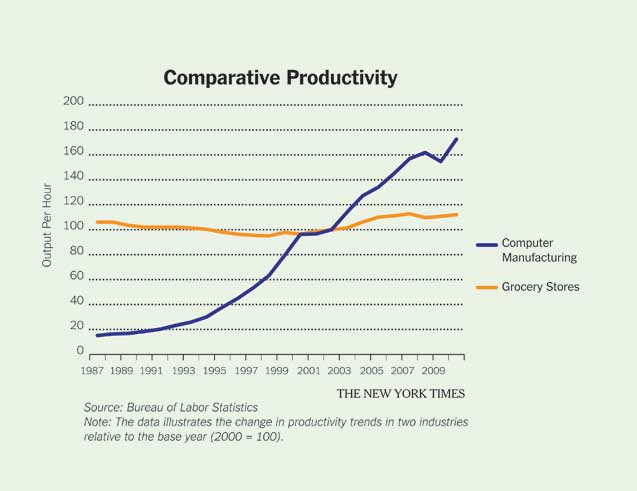
The commentators Mike Konczal and Jonathan Chait both had good blog posts recently on “You didn’t build that,” the statement President Obama made during a speech in July that, deliberately misinterpreted, has dominated right-wing discourse these past few days. But I think both of them missed a couple of tricks.
The first is that both in effect shrugged their shoulders over the fact that for several days running the central theme of the Romney campaign has rested on a complete lie.
I understand; going on about the dishonesty can get boring. But we should step back often to look at this remarkable spectacle. I really don’t think there’s been anything like this in American political history: a presidential campaign with a pretty good chance of winning that is based entirely on cynical lies about what the sitting president has said. No, Mr. Obama hasn’t apologized for America; no, he hasn’t denigrated achievement. Yet take away those claims, and there’s nothing left in Mitt Romney’s rhetoric.
The other thing that I think needs clarification is that it’s wrong to think of conservatives as having a single argument for their preferred policies. What they offer instead is more like an onion, with layers inside layers; every time you strip away one excuse there’s another one inside.
Thus someone like Paul Ryan, the Republican chairman of the House Budget Committee, starts by claiming to be a deficit hawk. Push him really hard, however, on why in that case he advocates big tax cuts, and he’ll shift to arguing that big government (as opposed to not-paid-for government) is the real problem. But if you push hard on that, it turns out that there’s yet another layer: the claim that policies like taxing the rich to help pay for social insurance are immoral, because people have a right to keep the wealth they created — which is why suggesting that no plutocrat is an island is heresy.
This onion structure is why you should never believe reasonable-sounding conservatives who say that you’re attacking a straw man, that “nobody believes” that wealth creators owe nothing to society.
Oh, yes they do — it’s usually hidden inside a couple of socially acceptable excuses, but at their core Mr. Ryan and people like him believe that they’re characters in “Atlas Shrugged.”
They Didn’t Build That
A few more thoughts related to the fake controversy over Mr. Obama’s “you didn’t build that” statement.
First, sure enough, a self-reliant businessman featured in Mr. Romney’s follow-up ads was the beneficiary of large government loans and contracts. This doesn’t make him a bad guy; pretending that he did it all himself does. And as many others have pointed out, what does it say about the Romney campaign that to run against a sitting president, one with a three-and-a-half-year track record, they have to lie about what he said to find a point of attack?
On a slightly more elevated note, Matt Yglesias a commentator at Slate, had some fun in a recent article with a prominent libertarian, Peter Thiel, who looks at the contrast between rapid progress in information technology and less rapid progress in “stuff” and blames … the government.
“I think we’ve basically outlawed everything having to do with the world of stuff, and the only thing you’re allowed to do is in the world of bits,” Mr. Thiel said during a debate organized by Fortune magazine on July 17. “And that’s why we’ve had a lot of progress in computers and finance.”
In a way, I’m reluctant to make too much fun of Mr. Thiel because he points to something that I notice a lot. If you look at what futurists were predicting 40 or 45 years ago, they somewhat underpredicted progress in I.T. (except for the artificial intelligence thing), but wildly overpredicted progress in dealing with the material world. Weren’t we supposed to have underwater cities, commercial space flight and flying cars by now?
But blaming the government is silly. The fact is that technological progress is uneven, for reasons that need have nothing to do with policy: sometimes we strike a rich technological vein that can be mined for decades, like etching circuits using photolithography, and sometimes we don’t.
Consider productivity in two industries, illustrated on the chart on this page, with data from the Bureau of Labor Statistics.

Does anyone think this contrast reflects the heavy hand of government on the grocery store industry — as opposed to the fact that there just hasn’t been a technological breakthrough that lets one guy at the counter serve 10 people at once?
That said, I still want my flying car before I get too old to drive.
Join us in defending the truth before it’s too late
The future of independent journalism is uncertain, and the consequences of losing it are too grave to ignore. To ensure Truthout remains safe, strong, and free, we need to raise $44,000 in the next 6 days. Every dollar raised goes directly toward the costs of producing news you can trust.
Please give what you can — because by supporting us with a tax-deductible donation, you’re not just preserving a source of news, you’re helping to safeguard what’s left of our democracy.